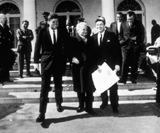Kennedy was always puzzled when I told him that I didn't understand an issue and was even more troubled when he discovered that there could be unfathomable difference between two factions of scientsist such as PSAC and the group that surroudned Edward Teller. Facts were facts, he used to tell me, and then I would then tell him that in science there were many more facts to be discovered thna were now known. I always remember his dismay when Teller and his sidekick, Johnny Foster, and I differed by more than a factor of twenty on how large an explosion could be tested underground. Foster said two hundred and fifty kilotons was the limit, while I said it was probably at least five megatons. "How", Kennedy asked me, "could two people using the same facts come to such different conclusions?" When I replied that in this case the facts were what you wanted them to be, that we were both guessing, he shrugged his shoulders in disbelief. When I went on to tell him that much of my information came from Teller and Richard Latter's theory on how the Russians could hide nuclear explosion in underground salt domes it was too much for him.
I never succeeded in teaching him exponentials in spite of many trys. He retaliated by telling me that my prose was not very good and sometimes even edited things that I had written. He loved words and looking for just the right word.
|
The Kennedy style in the beginning reminded me of a football game in which all the pertinenet players huddled to talk until the quarterback was satisfied with the play and then he would usually nominate one of the participants to be the ball carrier for the next phase. Sorenson, in his book, "Kennedy" says that Kennedy's style reminded him of a baskeball game because the ball was always in motion.
That was certainly true too. Perhaps we were both right. On any serious matter Kennedy always wanted to have the widest range of opinions that he could get, and often he would delay an important decision what seemed endlessly looking for one more input, while the staff, and sometimes the world, waited nervously until he was certain that there was no more for him to learn. For example, when we were trying to decide whether the United States should resume nuclear testing after the Soviets did in the fall of 1961, he kept asking me whether he had talked to everyon he should have, and I would always answer "no, you haven't talked to Edward Teller", and he wouldn't say anything. After about two weeks of this game he said "alright, bring him in", and I did. After that interesting confrontation, which I will detail later, he was ready to make a decision. His style, which gave each of us the freedom to act independently, and, at least once, cost us dearly as it stopped our drive for a comprehensive nuclear test-ban, persisted throughout his term.

|
